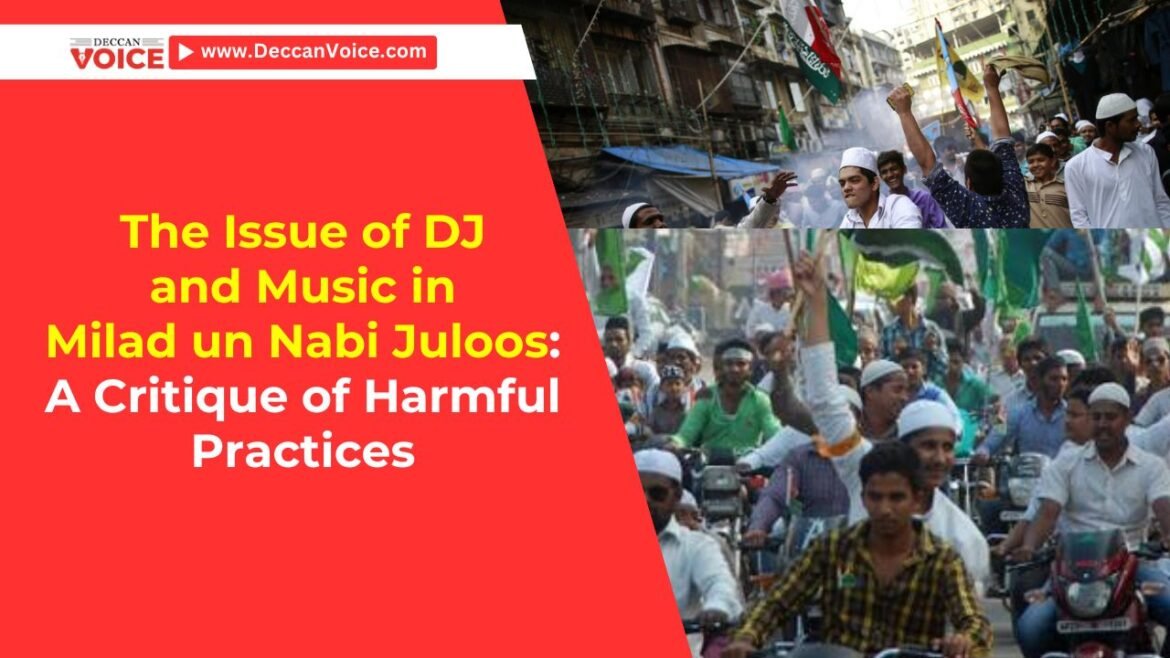Table of Contents
In recent years, the practice of celebrating Milad un Nabi (the birth of Prophet Muhammad) with bike rallies, loud DJ music, and dancing has become prevalent among certain Muslim communities, particularly in juloos (processions). While Milad un Nabi itself is meant to honor and reflect upon the life and teachings of Prophet Muhammad (PBUH), these modern celebrations often contradict Islamic principles, which clearly prohibit music, dancing, and any activity that causes harm or disturbance to others.
Music and Dance in Islam:
Islam traditionally prohibits music and dance in rituals or celebrations that can lead to morally questionable activities. There is a significant consensus among scholars that music, especially when combined with inappropriate behavior, is haram (forbidden). Despite this, some Muslims, especially younger generations, have embraced the trend of using DJs, loudspeakers, and bike rallies during Milad un Nabi processions, disregarding the impact this has on their neighbors and community. In Islam, any celebration that causes disturbance to others or promotes activities harmful to individuals or society is discouraged.
Sufi and Barelvi Influence:
Certain sections of the Sufi and Barelvi communities support these juloos, turning a blind eye to the presence of DJ music and loud celebrations, despite knowing that it contradicts Islamic teachings. This leniency can be attributed to their traditions, where music is used in Qawwali and other Sufi rituals, which some justify as acts of devotion. However, even these scholars should take a clear stance against the use of loud music, DJ performances, and dancing, as these practices, especially in public processions, harm the image of Islam and can disturb the peace.
Uneducated Youth and Misguided Practices:
The participation of young Muslim boys in bike rallies, reckless stunts, and dancing to DJ music is becoming increasingly common during Milad un Nabi. This not only tarnishes the sanctity of the occasion but also encourages a culture of irresponsibility. Public processions should not become platforms for such behavior, particularly when it brings harm to others, as Islam advocates for peaceful coexistence and respect for neighbors.
Influence of Hindu Festivals:
One noticeable factor contributing to these practices is the influence of Hindu festivals such as Ganesh Chaturthi and Hanuman Jayanti, where loud music and public celebrations are often part of the tradition. Unfortunately, some Muslims have adopted similar practices in reaction to these events, which only serves to erode the distinct spiritual and peaceful nature of Islamic traditions. It is important to note that both Hindu and Muslim communities have a majority who disapprove of such activities, but their silence encourages the few extremists to continue.
The Role of Scholars:
It is essential for scholars and community leaders to speak out against these harmful practices openly. If these un-Islamic celebrations are allowed to persist, they risk distorting the teachings of the Prophet Muhammad (PBUH) and casting a negative light on the religion. The Prophet’s life was marked by simplicity, kindness, and devotion, and any celebrations in his honor should reflect these qualities. Scholars must come forward and educate the youth about the importance of conducting peaceful and respectful celebrations, free from noise pollution, disruption, and reckless behavior.
Government Action:
Furthermore, the government should step in to regulate such activities, as public platforms should not be used to disturb the peace. While religious processions are a significant part of cultural expression, they should not interfere with the lives of others. Just as restrictions are placed on public rallies or protests to maintain law and order, similar regulations should apply to religious processions that disturb the peace of communities.
Conclusion:
The growing trend of celebrating Milad un Nabi with loud music, DJ performances, and reckless rallies is a disturbing departure from Islamic teachings. It is time for responsible Muslims, both scholars and laypeople, to come forward and put an end to these practices. Celebrations should focus on the Prophet’s message of peace, love, and humility, and not follow in the footsteps of practices from other faiths that do not align with Islamic values. By doing so, the Muslim community can preserve the sanctity of Milad un Nabi and present a positive image of Islam to the world.



